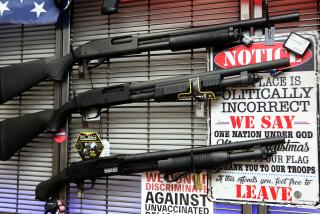Taking On the NRA
- Share via
A bill introduced in the U.S. Senate would ban the importation and sale of semi-automatic weapons, like the AK-47, and set up tough screening procedures to try to keep anyone with a criminal record from legally buying such guns. Los Angeles Police Chief Daryl F. Gates is one of those who supports the measure. What are the chances thatit will pass Congress and make it to the statute books? If history is any guide, and if the coercive influence of the National Rifle Assn. is no less today than it was last year, the chances are slight. But maybe, just maybe, in the aftermath of the murders by AK-47 of five children in a Stockton schoolyard a month ago history is about to change, and the NRA is about to lose one.
That’s a big maybe, but a few things have happened since last month’s tragedy to give some hope that more elected officials now sense that the public interest and the interests of the anti-gun-control lobby diverge very considerably on this issue, and that for a change the public interest had better prevail. Thus after the Stockton bloodbath a number of California communities, Los Angeles among them, adopted ordinances barring the sale of semi-automatic weapons like the AK-47, the AR-15, the Uzi and the MAC-10. Pending before the Los Angeles Board of Supervisors is a proposal to ban such sales in unincorporated county areas. A similar ban has been introduced in the California Legislature and has won support from top law-enforcement officials.
A tougher law on semi-automatic rifles has two things going for it: First, it’s hard to argue that citizens worried about becoming victims of crime need rapid-fire weapons to defend themselves, their homes or their businesses. Second, increasing numbers of these weapons are passing into the hands of youth gangs and drug dealers, raising the possibility, as Gates told senators, that the police could soon find themselves outgunned.
To be effective, though, the controls on semiautomatic rifles would have to be applied on a national scale. The fact that the AK-47 that was used by Patrick Purdy to kill five and wound 30 on Jan. 17 was bought legally and openly in Oregon and simply carried across the border into California shows that local option is largely irrelevant. State and municipal bans are certainly important as expressions of public concern, but it’s clearer now than ever that only a federal law has any chance of controlling the dangerous spread of semi-automatic weapons. At least it’s clearer to most people. President Bush, a lifetime member of the NRA, says that he still opposes federal controls on semi-automatic weapons. The problem, he claims in what has become the NRA’s mantra, is with criminals, not guns. But of course if it were made more difficult for criminals and psychopaths to get hold of certain kinds of guns, the problem would diminish.
The law as it currently stands is simply absurd. A purchaser need only fill out a form denying that he’s a convicted felon, an illegal alien or someone with a medical history of mental instability. No background check is made on would-be purchasers.
The measure before the Senate, sponsored by Howard M. Metzenbaum (D-Ohio), would apply to the sale of semi-automatic weapons the same regulations that now govern the sale of machine guns: Shoppers would be subjected to background checks to identify those who had criminal arrests or convictions, and law-enforcement authorities would have to certify that the weapons were being purchased for licit purposes. All this should at least work to restrict the number of semi-automatic weapons that can be legally obtained, even though it would do next to nothing to reduce the supply of such weapons--estimated at up to 500,000--that are already in private hands. But at least the regulation and the ban on future imports of semi-automatic rifles would begin to impose some measure of sanity on what has become a demonstrable and growing threat to public safety.
More to Read
Get the L.A. Times Politics newsletter
Deeply reported insights into legislation, politics and policy from Sacramento, Washington and beyond. In your inbox twice per week.
You may occasionally receive promotional content from the Los Angeles Times.










